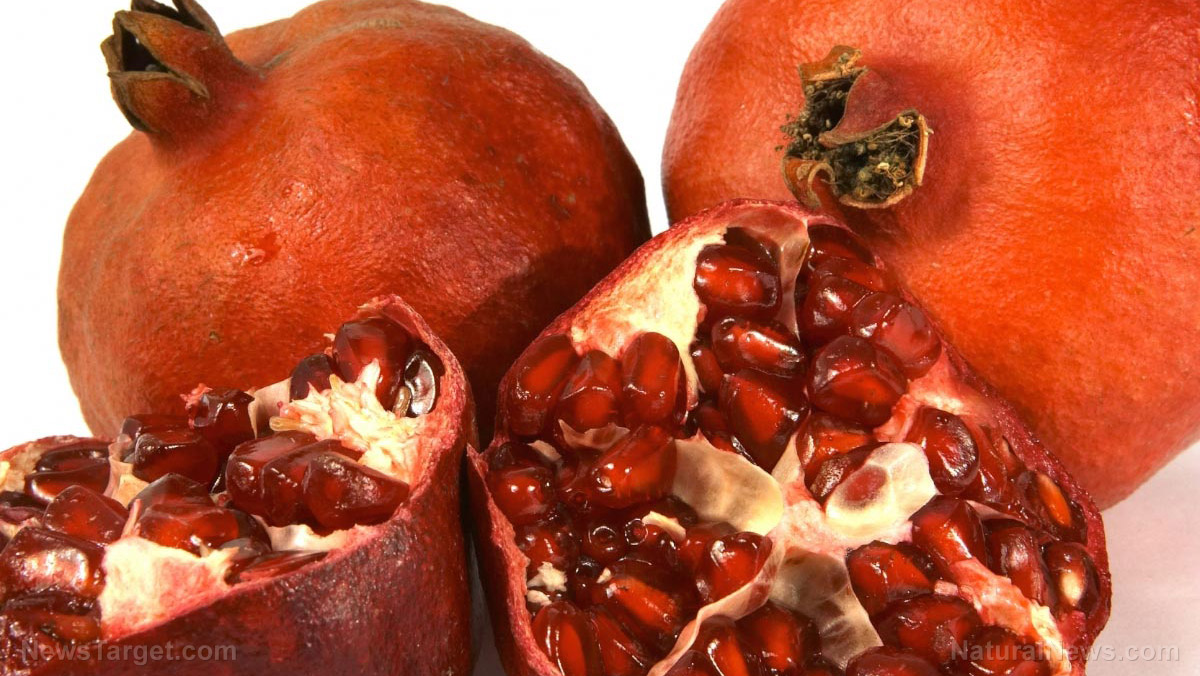Study suggests pomegranates can slow the growth of cancer cells
06/14/2022 / By Zoey Sky

Pomegranate (Punica granatum) is a nutrient powerhouse rich in antioxidants, dietary fiber, vitamin C and beneficial tannins. The fruit has often been the subject of various studies because it offers benefits for cardiovascular health.
A recent study has also found that pomegranate has incredible anti-cancer activities.
What are pomegranates?
Pomegranates are round, red fruits with a white inner flesh full of arils or crunchy, juicy edible seeds.
If you’ve tried eating pomegranates, don’t be put off by how difficult it is to remove the arils. Keep trying because their nutritional profile and flavor are worth the minor inconvenience.
Pomegranates are low in calories and fat but full of dietary fiber, vitamins and minerals. They also contain some protein.
One average-sized (282 grams) pomegranate contains the following nutrients:
- Calories (234)
- Protein (4.7 grams)
- Fat (3.3 grams)
- Carbohydrates (52 grams)
- Sugar (38.6 grams)
- Dietary fiber (11.3 grams)
- Calcium (28.2 mg or 2 percent of the Daily Value (DV))
- Iron (0.85 mg or 5 percent of the DV)
- Magnesium (33.8 mg, or 8 percent of the DV)
- Phosphorus (102 mg, or 8 percent of the DV)
- Potassium (666 mg, or 13 percent of the DV)
- Vitamin C (28.8 mg, or 32 percent of the DV)
- Folate or vitamin B9 (107 mcg, or 27 percent of the DV)
Pomegranate juice significantly slow prostate cancer cell growth
In the study, researchers found that pomegranate juice had incredible effects in slowing the development of prostate cancer. Additionally, pomegranate can help treat and prevent breast and colon cancer. (Related: Pomegranate may inhibit metastatic breast cancer.)
Prostate cancer is the most commonly diagnosed cancer in men and it makes up 29 percent of all male cancers. The American Cancer Society reports that prostate cancer is the second leading cause of cancer-related deaths in the U.S.
Doctors assess the status of the disease by measuring how long it takes levels of prostate-specific androgen (PSA) to double.
In a study published in the journal Clinical Cancer Research, men with rising PSA rates were given eight ounces of pomegranate juice a day.
According to the results, it took longer for their mean PSA rates to double. In fact, time increased from 15 months at baseline to 54 months into post-treatment.
The volunteers also experienced a 12 percent decrease in cell proliferation and a 17 percent increase in apoptosis, or cancer cell death. The researchers found the “statistically significant prolongation of PSA doubling time” promising and believe additional studies can help them learn more about the health benefits of pomegranates.
Pomegranate hinders growth of breast cancer and intestinal tumors
According to animal studies, pomegranate has protective effects against chemically-induced breast cancer. Results showed that when given before and after exposure, pomegranate extract reduced the incidence, the number and size of breast tumors.
In a study published in the journal Nutrition and Cancer, researchers observed a “striking reduction of mammary tumor incidence and total tumor burden.” They added that with further study, pomegranate could be developed as a drug to reduce breast cancer risk.
Intestinal bowel diseases like Crohn’s disease and ulcerative colitis can significantly increase the risk of intestinal cancers. But according to studies, animals with experimentally-induced colitis treated with ellagic acid showed inhibited progression of colitis.
The researchers also observed a “switching-off” of signaling molecules that would otherwise be activated and promote cancer.
Data also suggest that pomegranate intake helped improve survival rates in animals with colon cancer.
Pomegranate targets cancer cells with multiple methods of action
Three pomegranate polyphenols, namely luteolin, ellagic acid and punicic acid, have been shown to prevent metastasis. These polyphenols also helped delay the development of tumors and inhibited the spread and progression of prostate cancer in animals injected with human tumor cells.
Two polyphenols in pomegranate, ellagic acid and punicalagin, can help prevent DNA damage. This is important because mutations in genes are linked to cancer.
Data also suggest that pomegranate extract can help interfere with abnormal cell-proliferation cycles to prevent the out-of-control proliferation that characterizes cancer. The extract also helps fight inflammation by targeting pro-inflammatory molecules.
Research also shows that pomegranate extracts stop tumors from forming by causing apoptosis. They also inhibit angiogenesis or the formation of new blood vessels to nourish the tumor.
The extracts can also help stop metastasis or the invasion of healthy tissue by quelling the production of “protein-melting” enzymes and signaling molecules that makes cancer invasive.
Lastly, pomegranate extract can help slow the growth of many hormone-dependent cancers.
Incorporating pomegranate into a healthy diet
There are many ways to add pomegranate into a balanced diet for cancer prevention and improving your overall well-being.
While there is no established dosage for pomegranate extract, some herbalists and integrative physicians recommend amounts ranging from 50 ml to 240 ml a day. Note that pomegranate can interact with some medications, so consult with a trusted naturopathic professional before supplementing with pomegranate juice or extract.
Follow a balanced diet and eat nutritious fruits like pomegranates to boost your overall health.
Watch this video about the compounds in pomegranate juice found to trigger cancer cell death.
This video is from the Natural News channel on Brighteon.com.
More related stories:
Relieve muscle spasms naturally with the pomegranate.
Pomegranate Extracts Found to Inhibit Inflammation.
Pomegranate juice components block cancer cell migration.
Sources include:
Submit a correction >>
Tagged Under:
alternative medicine, cancer treatment, food cures, food is medicine, fruits, functional food, natural cures, natural medicine, phytonutrients, pomegranates, Prostate cancer, research
This article may contain statements that reflect the opinion of the author
RECENT NEWS & ARTICLES
COPYRIGHT © 2017 ONCOLOGY NEWS



















